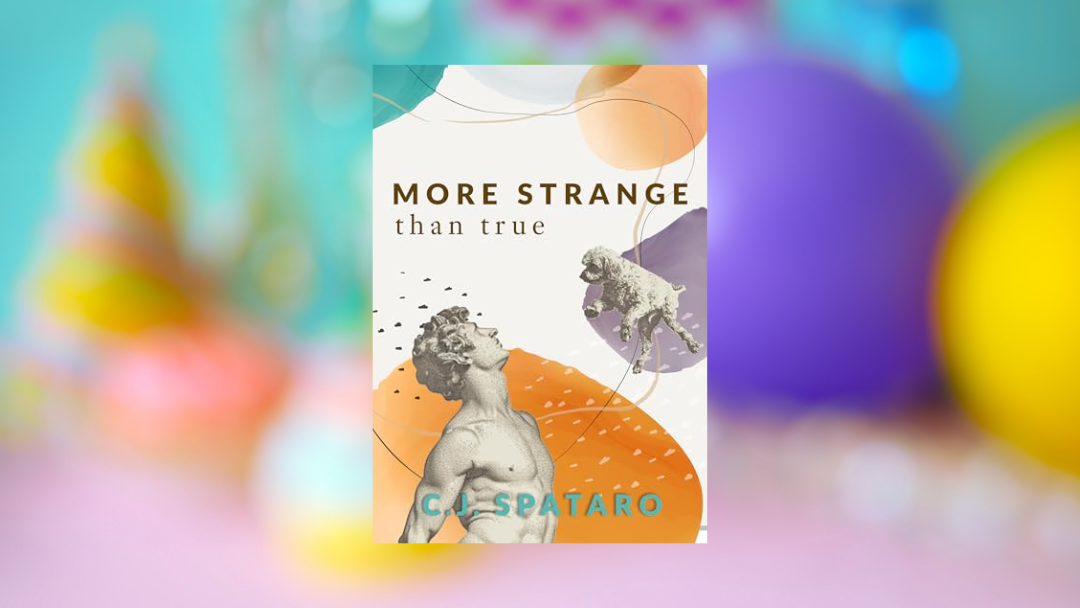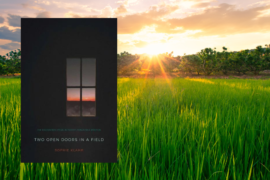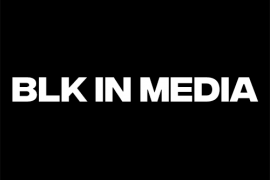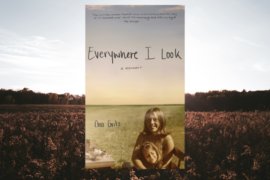Ayesha F. Hamid: More Strange Than True is complex, compelling, and full of rich world-building and detail. What inspired you to write this book? If this is not the genre you typically write in, what compelled you to write in the fantasy genre?
C.J. Spataro: I originally was working on a collection of speculative short stories all centered on a female relationship. As I was working on these stories, I started thinking about a time not long after I first moved to Philadelphia. I had a dog then (and how I came about having him is a whole other story) and I was also really struggling with depression and loneliness. There were times when I would look at my dog and think, why can’t I find someone in my life who loves me like this? No judgement, no expectations, just love and acceptance. The more I started thinking about this idea, the more it just started to spin out – a whole “what if” scenario. What if your dog did get turned into a man? What would that look like? How would it happen? Once I really started thinking about it, I realized it was too big of an idea for a short story.
I have written speculative works before – lots of short stories, but this was the first novel that I’ve attempted that could be slotted into a fantasy category. I really didn’t see any other way to tell the story and it was a story I really wanted to explore. The more I discussed this idea with other people, the more I found out that I was not the only person who’d ever wished their dog was a person! I knew I would have my work cut out for me. I was very nervous about the worldbuilding aspects of writing a fantasy novel, but at least I could lean heavily on the real world of Philadelphia!
AFH: The plot of More Strange Than True is amazing – I love how the plot moves in a way that is action-packed, clear, consistent, and connected. I also love how you weaved literature and mythology into the plot while moving between places and timelines. The reader finds themselves immersed in the world of the book, a world of fairies, elves, and magic and wanting to find out what happens next. Are you a writer that plots out everything in advance or did the plot emerge as you were writing the book? How many times did you revise the book? How long did it take to write the book?
CJS: I am not a plotter, I’m sorry to say. I am 100% what is sometimes referred to as a pantser, meaning, I write by the seat of my pants. I did try something different with this novel, which I tried again with the book I’m working on now and it didn’t help at all. What I did with More Strange is a used a simplified outline of a three act structure/hero’s journey. I’m sure anyone who’s ever attempted to write a book as heard about the hero’s journey and the idea of a three-act structure. I don’t know how much I really subscribe to the idea of a three-act structure when it comes to writing a novel. There are no act breaks in a book – there are chapter breaks and scene breaks – but this language is very common, especially when it comes to screenplays and stage plays. So what I did was, I used each of these thirteen steps as a prompt to get me into the next section of the book. I had a very loose idea of the characters and what I thought I might happen and so when the outline said something like, “inciting incident: the event that sets the story in motion” I used it as a jumping off point to propel the plot.
I want to say that I started this book in 2016, but maybe it was 2015? I think I finished the first draft in 2017 and I started letting people read it in 2018. I was also working on short stories and working full-time. It takes me a while. I’m sure I did at least six full revisions and I spent several years querying it while I tweaked it and wrote other things – including a new novel.
AFH: As I mentioned in the previous question, I loved the literature and mythology incorporated into the book, like themes and characters from the works of William Shakespeare and Johann Wolfgang von Goethe. The interplay of the literary world and the world that the characters reside in was flawless. Was incorporating the different worlds into one plot the most difficult part of writing the book? Did you already have this knowledge at your disposal from specializations in school or was the world building based on research? How extensive was the research process for this book?
CJS: I was familiar with A Midsummer Night’s Dream and the Goethe poem, “Der Erlkonig” from studies as a music student. I read and reread these works several times. Der Erlkonig was set to music by Franz Schubert, and I listened to a very famous recording of it by Dietrich Fischer-Dieskau many many times. That was kind of an “a-ha” moment for me, when a bunch of things that had been giving me problems all kind of clicked together. I also did a fair amount of research on dogs. I read this really great nonfiction book Inside of a Dog by Alexandra Horowitz. It’s part memoir, part scientific explanation of how dogs work physically – what colors they see, how well they can smell, do they actually have emotional attachments to their owners? I also did research on different depictions of faeries in various cultures, specifically Norse and Celtic mythologies, and then revisited the specific mythological stories for Ondine and Iolanthe – both of which I was also familiar with because of my background in music.
AFH: What was the most difficult part of writing this book?
CJS: That’s a difficult question! The hardest part for me of writing any book is getting from the end of the messy middle to the end of the end and that was definitely the case with More Strange Than True. I was really stuck for a while. I’d turned Oberon into a man, I’d gotten the faeries to Philadelphia, established the conflict and then what? Something else had to happen to propel the novel toward the ending and that’s when I started thinking about the Goethe poem and thought, what if I tried X? At first, I thought this will never work, but I decided to try it anyway – I didn’t really have anything to lose and all the pieces just kind of clicked together.
AFH: What did you love about writing this book?
CJS: I had so much fun writing this book. I sort of fell in love with the characters as I was writing them. Even a character like Titania, who functions as the antagonist, is not really a villain. I love writing arch and kind of bitchy characters – characters without much filter, since in real life most of us have to filter what we say all the time. Bobby was a blast too. I got to channel all my experiences working in Philadelphia restaurants into him. Philadelphia is a city full of “characters” and I thought Bobby would fit right in. Puck’s Place is definitely a restaurant where I would be a regular. Finally, writing this book gave me an opportunity to write about the city I love so much. I’m not a native Philadelphian, but I’ve lived here now for over 30 years, and because of that, I think I may have a different perspective than someone who’s lived here their whole life. Not better or worse – just different. Philly is a special place.
AFH: The main character, Jewell, deals with trauma throughout the book though she continues to long for love and connection, which are elusive. Love and connection end up being difficult for multiple characters in the book. What are the philosophical questions the book is grappling with, and do you, as the author, take a stance on those philosophical questions? For example, just as there is magic, are some cursed to a lack of connection?
CJS: I hope that all of the characters in the book find some kind of happiness, whether that is with another character or within themselves. Connection in our current world is very difficult. Loneliness has become an official epidemic. Social media is supposed to bring us together, but in reality, it does just the opposite. How many times have you been out to eat and seen people sitting at the same table, not talking, but each bent over their phones? I think most of the characters in the book do struggle with the nature of love. To really love someone is a choice and it often requires a certain amount of sacrifice. At a certain point, each of the major characters has to ask themselves what it is they really want, and what are they willing to do for it?
AFH: The book has a powerful and memorable ending. Though it may be difficult to answer this question without it being a spoiler, did the book have to end the way it did? Did you have any other endings in mind or did the story have to end this way?
CJS: This was the ending that I had in my mind from the beginning. It definitely did not have to end this way, but then the book would have been different. As I was drafting, I had to think about how I was going to weave those threads throughout the book to support the ending that made the most sense to me. So, I guess, yes – this is the way the book needed to end. Someone else might have given it a different ending.
AFH: I would love to see the sequel of More Strange Than True! The book can stand alone because all the immediate questions the reader has are answered, but I really want to know what happens to the characters next. The world in More Strange Than True is a unique world all its own, and I would very much like to see what happens next. Are you planning to make this book into a series? Are you working on any other projects?
CJS: I have some ideas about a sequel, perhaps and maybe also writing novel with some of the secondary characters taking on the main role. Iolanthe and Ondine both have ready-made back stories, and my favorite minor character is Thomas Peaseblossom. I have a new novel and a short story collection that are ready to go and another novel in the research/planning stages. There’s also something I started a while ago and didn’t exactly abandon, but more sort of put on the back shelf. I had a feeling the book was going to be very long, and I wasn’t sure I was ready to tackle it, but I’ve never forgotten about it and have some new ideas that I think could work. We’ll see.
AFH: When will the book be available and where can it be purchased?
CJS: The book will be available June 22, 2024, from all the usual locations and can be pre-ordered from Asterism Books (US), Gazelle Books (UK) and Ingram Content Group (US and worldwide).
AFH: What book events are coming up?
CJS: The big one is the book launch on Friday, June 21 at the Mummers Museum in S. Philly. I’m also doing a Local Author Saturday Spotlight at the Barnes and Noble in Center City Philadelphia on Saturday, June 29th. Anyone interested can check my website for updates. I’m hoping to schedule some readings in Michigan this summer and more in the Philly area in the summer and fall.
AFH: Did you gain inspiration from your favorite authors in terms of writing this book? Who is your favorite author? What advice do you have for writers who gain inspiration from this book and would like to write fantasy?
CJS: I don’t think I necessarily gained inspiration from any one author or book. I get inspired by a lot of things: books, music, television, film, art, food – just about anything. I don’t know if I have a favorite author or book. I do have touchstone books that I go back to and re-read. Last summer I re-read Jonathan Strange and Mr. Norrell by Suzanna Clarke. That novel did give me some inspiration with regard to the magic and the faeries. I really love that book a lot, but it’s long, so I think it’s one of those books that you are either really into or not into at all.
To be honest, my students are the ones who’ve inspired me the most. For a long time I was afraid to write fantasy or science fiction, but I saw so many of my students fearlessly tackling it that I thought I could give it a try. I think that’s what I would tell any writer – don’t let your fear keep you from trying out new and different ways of approaching your work.
AYESHA F. HAMID is a poet and creative nonfiction writer published in Sheepshead Review, Blue Bonnet Review, and Rathalla Review. Her full-length memoir, The Borderland Between Worlds, is available through Auctus Publishers. Her work explores themes of isolation, survival, and hope.
Ayesha is a Poetry Editor at Ran off with the Star Bassoon and an Assistant Poetry Editor for The Night Heron Barks. She is Editor-In-Chief at The City Key.
Ayesha holds an M.A. in Publishing, an M.F.A. in Creative Writing from Rosemont College, and an M.A. in Sociology from Brooklyn College.
Like what you’re reading?
Get new stories, sports musings, or book reviews sent to your inbox. Drop your email below to start >>>
NEW book release
Direct Connection by Laura Farmer. Order the book of stories of which Mike Meginnis says there is “an admirable simplicity at their heart: an absolute, unwavering confidence in the necessity of loving other people.”
GET THE BOOK



